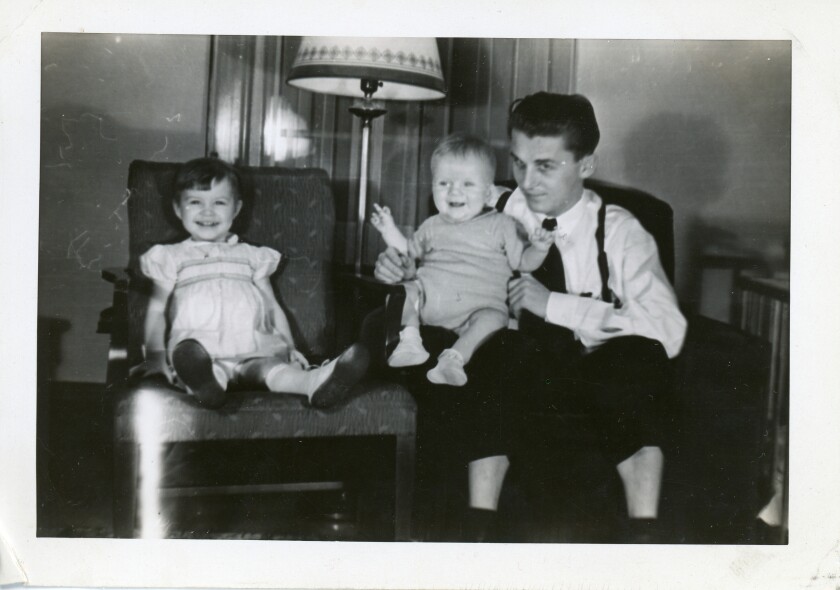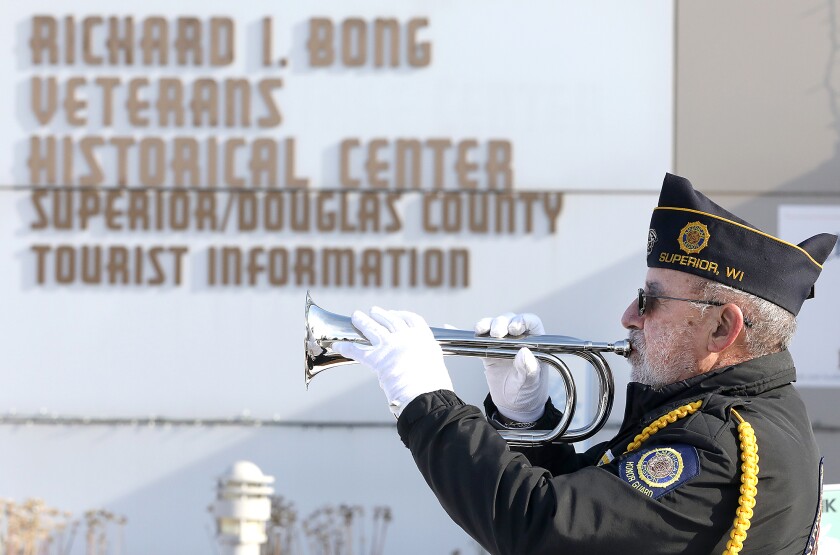GORDON, Wis. — A town of Gordon native who earned the nickname “Wisconsin’s Fighting Priest” for his advocacy work on behalf of Native Americans was inducted into the in Minnesota Sept. 29.
Fr. Philip Gordon, grandson of town founder Antoine Gordon, attended St. Thomas Academy and St. Thomas University in Minnesota prior to attending seminary. In 1913, at the age of 28, he became the first Native American to be ordained as a Catholic priest in the United States.
ADVERTISEMENT
Telegram reporter Maria Lockwood is joined by Antoine and Sarah’s great-great-grandson Doug MacDonald, as well as Brian Finstad — both of the Gordon-Wascott Historical Society — as MacDonald shares stories of Antoine and Sarah that were passed along in his family.
Antoine (pronounced An-twine) was born in 1812 in Sandy Lake, Minnesota and died in 1907. Sarah was born in 1827 in Burnett County, Wisconsin and died in 1911. They met on Madeline Island, married in 1843 and went on to have three daughters and two sons.
Antoine was community-minded and involved in many things, including as a storekeeper in Gordon. He founded a mission that became the Catholic Church. He also started the first school in Gordon. This, despite the fact that he didn’t have much schooling of his own.
“He really only had not even a six-month education, but yet, he spoke five languages,” says MacDonald. “Latin, Sioux, Chippewa, English, French.”
What brought Antoine and Sarah to the Gordon area?
“He was up and down the St. Croix River trading in years past,” says MacDonald. “He thought that it (Gordon area) was a choice spot apparently and apparently, it was.”
Finstad jokes that Antoine and Sarah “founded the best town in Douglas County.”
“I think they are some of the most interesting historical figures of the area,” says Finstad. “In their time, they had wide influence. They were so well-connected, if not related, to people in sort of fur-trade era society and the local native communities. Their story is just an interesting story. They moved around a lot and they were well-connected and had a lot of interesting events.”
Also in this episode, Maria, Doug and Brian discuss when Antoine walked from Gordon to Crow Wing in Minnesota in the 1860s to see his cousin, Chief Hole-in-the-Day, what came out of that visit and did Antoine’s 12-year old son William make the trip; how Antoine and Sarah met; what was Gordon before it became a town; Antoine’s generous heart; how he helped the area during a smallpox outbreak; where can we see Antoine and Sarah’s influence today in Gordon; the process of getting the log cabin listed on the historic register; who owns their log cabin these days; stories of Antoine and Sarah’s grandson Father Phillip Gordon; Antoine’s penmanship and letter writing style; Sarah’s involvement in the fur trade; and much more.
New episodes of Archive Dive are published monthly. Listen here or wherever you get your podcasts. Episodes are edited and produced by Duluth News Tribune digital producers Wyatt Buckner and Dan Williamson. If you have an idea for a topic you’d like to see covered, email Maria Lockwood at mlockwood@superiortelegram.com.
“He had a rich series of connections, activist connections, of being able to fight for Native American rights with some success many, many years ago, but people are not aware of exactly what he did,” said Terry Friedrichs, a 1974 academy graduate who nominated Gordon for the hall of fame.
Gordon was a pastor who cared for many people who were dying, ill and in harm’s way, Friedrichs said. The priest was able to balance the everyday work of caring for others with being an activist.
According to the nomination material, Gordon served as pastor in seven Ojibwe churches and missions in Wisconsin from 1918 to 1924 and as pastor of an Irish American parish in Centuria, Wisconsin from 1924-1948.
Gordon also helped the “Committee of 100,” to advocate for full citizenship for Native Americans. He raised support for Native causes internationally in both Rome and Ireland and mentored Native American troops in the Midwest during World War II.
Doug MacDonald, Gordon’s great-nephew, still lives in the town of Gordon. He was unable to attend the Sept. 29 ceremony, but sent down a speech for his niece to read. MacDonald was 5 years old when Fr. Gordon died in 1948, but his mother shared stories of her uncle.
“It’s quite an honor for him and the family that he’s recognized because he really was, one, quite an athlete in his day; and two, he was just a controversial figure to go for the underdog, the poor white, the poor Indians, and standing up for them. And he had quite a colorful career of doing that,” MacDonald said.
Friedrichs nominated Gordon for showing “straight-ahead character as a sportsman, student, priest and humanitarian.” While it focused on his time at St. Thomas Academy, the nomination included athletic achievements Gordon earned at both the academy and university as well as his character and his career after school.
ADVERTISEMENT
“He was ... an individual with a lot of integrity who just so happened to help the team. He helped the St. Thomas teams he played on. He helped the Catholic church. He helped inspire many people who fight for rights. He was able to fulfill both those functions. So many people sweat these days about, ‘Can I be an individual and help the group?’ But he was able to do it many, many years ago,” said Friedrichs.
The academy’s hall of fame dates back to 2008, but many individuals prior to that were lost to history, Friedrichs said. They opened a senior committee three years ago to honor graduates from 1885 to the early 1960s. Fr. Gordon’s rich history of activism and sports caught Friedrichs’ attention.
The Gordon native excelled in academics and was a three-sport athlete. Ten of the 15 teams Gordon played on during his time at St. Thomas won championships. He reportedly accumulated more athletic letters than any other student at that time during his four years at St. Thomas. Friedrichs put the nomination together over months and sent it in. Three years later, he learned Gordon would be inducted into the hall of fame.
“You could have knocked me over with a feather,” Friedrichs said.
It’s not the only tribute to Gordon. Two books have been written about Wisconsin’s fighting priest.
“Ojibwe, Activist, Priest: The Life of Father Philip Bergin Gordon, Tibishkogijik,” by Tadeusz Lewandowki was published in 2019 as Friedrichs was researching his nomination, while “The Indian Priest: Philip B. Gordon, 1885-1948” by Paula Delfeld was published in 1977.
“It’s quite something to know how he excelled,” MacDonald said.
ADVERTISEMENT
MacDonald's takeaway from Gordon’s hall of fame induction was “Basically, that he did exist and not to be forgotten.”














